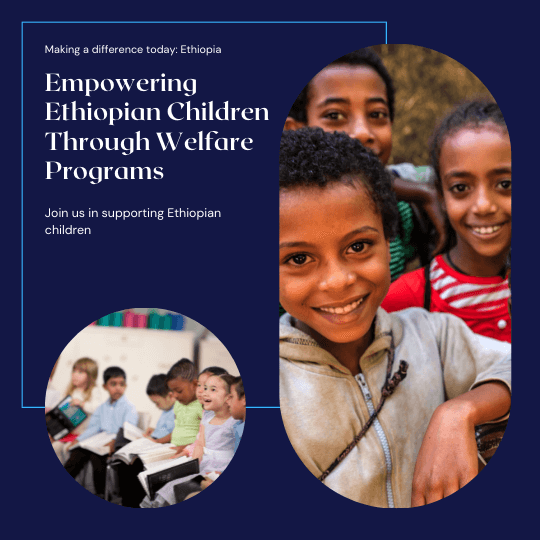Call us at (970) 405-2675 or visit the main page here to get involved with Ethiopian child welfare programs. Fill out the form here to start donating.
The Importance of Child Welfare Programs
Ethiopian child welfare programs are essential for the well-being of children in Ethiopia. Many children face severe challenges such as poverty, malnutrition, and lack of education. Therefore, these programs aim to provide comprehensive support to improve their quality of life. Moreover, by addressing these issues, we can help create a brighter future for these children.
Education Initiatives
One of the primary focuses of Ethiopian child welfare programs is education. Providing access to quality education helps children break the cycle of poverty. For example, building schools and providing learning materials are crucial steps. In addition, teacher training ensures that educators can deliver effective lessons. As a result, children can achieve better academic outcomes and have more opportunities in the future.
Health and Nutrition Support
Health and nutrition are also critical components of child welfare programs. Malnutrition and poor health significantly impact a child’s ability to learn and grow. Therefore, providing nutritious meals and regular health check-ups is essential. For instance, school feeding programs ensure that children receive at least one balanced meal each day. Consequently, this improves their health and concentration, allowing them to perform better in school.
Community Engagement
Engaging the community is vital for the success of these programs. Local communities play a crucial role in supporting and sustaining child welfare initiatives. For example, involving parents in educational activities encourages them to prioritize their children’s schooling. Moreover, community volunteers can assist in various program activities, such as mentoring and tutoring. In other words, a collective effort ensures the longevity and effectiveness of these programs.
Economic Empowerment
Economic empowerment is another significant aspect of child welfare programs. By supporting families economically, we can indirectly improve the well-being of children. For instance, vocational training for parents can lead to better job opportunities. Therefore, they can provide a more stable and supportive environment for their children. In the same vein, microfinance initiatives help families start small businesses, increasing their income and financial stability.
Mental Health and Psychological Support
Mental health is often overlooked but is crucial for a child’s overall development. Many children in Ethiopia experience trauma and stress due to their challenging circumstances. Consequently, providing psychological support and counseling services is essential. For example, trained counselors can help children cope with their experiences and build resilience. Above all, addressing mental health issues ensures that children can lead healthier and more fulfilling lives.
Access to Clean Water and Sanitation
Access to clean water and sanitation is fundamental to children’s health. Many communities in Ethiopia lack basic sanitation facilities, leading to waterborne diseases. Therefore, child welfare programs often include initiatives to provide clean water and improve sanitation. For instance, building wells and installing latrines in schools and communities. As a result, this reduces the incidence of disease and improves overall health.
Protection and Advocacy
Protecting children’s rights is a core element of child welfare programs. Many children in Ethiopia are vulnerable to abuse, exploitation, and neglect. Therefore, advocacy and protection efforts are crucial. For example, raising awareness about children’s rights and providing legal support for victims of abuse. Similarly, working with local authorities to enforce child protection laws. In short, ensuring that children are safe and their rights are respected.
Conclusion
Ethiopian child welfare programs play a vital role in improving the lives of children. By focusing on education, health, community engagement, economic empowerment, mental health, clean water, and protection, these programs address the multifaceted needs of children. Therefore, supporting these initiatives is crucial for creating a better future for Ethiopia’s young generation. Together, we can make a lasting impact and help Ethiopian children thrive.

